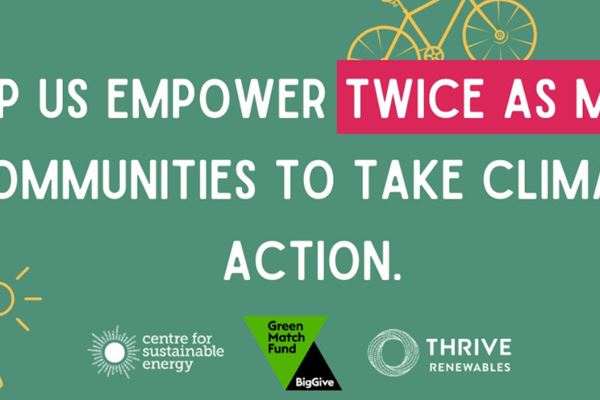Our mission has always been to connect people with clean energy projects. We want as many people as possible to access the environmental, economic and social benefits of renewables.
That’s why we’re thrilled to be teaming up with community energy group, Bristol Energy Cooperative, to give local residents the opportunity to own a share in our 20 MW battery located on Feeder Road in Bristol. This is the first time in the UK that an owner has offered the local community an opportunity for shared ownership of a standalone commercial battery project.
The battery is currently being commissioned and when it’s live will have the capacity to store and deliver 1.5 hours or 30MWh of electricity to the national and local grid. Not only will the project provide crucial flexibility and balancing services, but the agreement with BEC means that local causes will be able to benefit from a share of any revenues generated.
“Thrive was set up nearly 30 years ago to power the UK’s clean energy transition by connecting people to clean energy – offering co-investment to community groups helps us deliver that. To ensure a just transition, we need the benefits of renewables to be local, giving everyone the opportunity to access cleaner energy, cheaper bills and new green jobs.
“Battery storage is a critical technology for the UK to reach net zero, storing electricity when renewable power is abundant and making it available during peak times when consumption is at its highest. We’re thrilled to be working with the local community on this project, which not only supports the UK’s net zero goals, but Bristol’s ambition to become a carbon neutral city by 2030.” - Matthew Clayton, Managing Director, Thrive Renewables
We’ve invested a total of £29 million in clean energy projects across Bristol, funding more than a third of the city’s renewable electricity generation and storage capacity (37%)*. This includes our 8.2MW wind farm in Avonmouth and the £4 million loan we provided to Ambition Community Energy (ACE) to fund the construction of England’s largest community-owned onshore wind turbine.
The local community have been heavily involved since the start of the project. In 2020, the site was originally signposted for a diesel-fuelled STOR plant however, thanks to a successful planning appeal from a group of residents in St Phillip’s Marsh, the project was shelved. ‘Residents Against Dirty Energy’ (RADE) is now helping to support groups facing similar issues elsewhere.
"8 years ago, RADE formed to fight 48 Diesel Generators 100m from the Nursery School. We've come full circle and welcome a battery storage scheme on the same site. If the Diesel scheme had gone ahead, it would have been like 100 double-decker buses idling outside the school.....” - Stuart Phelps, Core Member, Rade
“Community energy gives people agency to take practical action on climate change in their local community. This project is a perfect example of how the community coming together can bring about real change. People power fought off a highly-polluting diesel scheme and replaced it with the storage technology we need to help us go net zero.” - Andy O’Brien, Co-Director, Bristol Energy Cooperative
With construction now complete, our team has also developed a landscape plan for Feeder Road that will help to protect and enhance the biodiversity of the site. We’ve focused on providing the resident wildlife with more places to nest and shelter. This includes installing a number of bird, bat and invertebrate boxes, as well as planting trees, hedgerows, species rich grassland, shade scrub and native ferns that will strengthen local habitat corridors and provide wildlife with food, nectar and pollen. The biodiversity improvements at the site will amount to a total investment of £100,000.
*Based on non-combustion renewables including wind, solar and battery storage, excluding anaerobic digesters and energy from waste.
https://www.gov.uk/government/publications/renewable-energy-planning-database-monthly-extract



